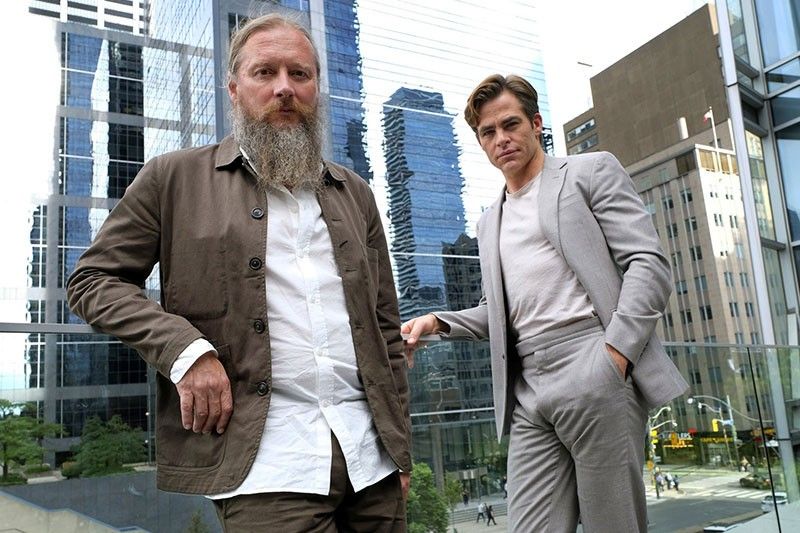Chris Pine and David Mackenzie reunite for ‘Outlaw King’

If you want to see an exhausted Chris Pine, meet him after he’s spent a day answering questions about his penis.
Following the September premiere of David Mackenzie’s “Outlaw King,” in which Pine stars as the Scottish hero Robert the Bruce, conversation at the Toronto International Film Festival focused largely on Pine’s instant of full-frontal nudity in the film. That such a brief moment should arouse such curiosity — and not, say, anything else in the two-plus hours of historical-epic savagery in the 1300s-set film — was for Pine a sad but telling commentary.
“The fact that visions of nudity, genitalia, making love are somehow the main attraction,” said an exasperated Pine in an interview alongside Mackenzie. “All of us go ‘Oo oo!’ like fifth graders. Literally, it’s like talking to a bunch of 14-year-olds, whereas beheadings and all that kind of violence we’re so inured to that we don’t even question it.”
The irony is that Pine’s Bruce — like his supporting role in Patty Jenkins’ “Wonder Woman” — is a negotiation with traditional gender roles, even amid all the blood and guts. Pine plays the 14th century King of Scots, who won Scottish independence from England, not as a one-dimensional warrior but a man riven with internal conflict. Scenes with his wife (played by Florence Pugh) are sensitive and tender.
When it’s pointed out that his performance — and even that flash of nudity — seems intended to deconstruct traditional masculine archetypes, Pine immediately brightens.
“I’ve been dying to talk about this stuff all day and we’ve gotten just myriad, mind-numbing questions about nonsense,” Pine replies. “I do think there needs to be a rebalancing of the world. The underlying bass note that we should be hearing is: That is precisely what we’re all used to and isn’t it kind of interesting that it’s so skewed that way, that any notions of tenderness or lovemaking on screen becomes uncomfortable? I think that’s probably the masculine and the feminine out of whack in this big, wide universe.”
“Outlaw King,” which debuts on Netflix and in select theaters Friday, is the streaming service’s first big swing at that classic big-screen thing: the historical epic. It reunites Pine with Mackenzie two years after “Hell or High Water,” a high-water mark for both the Scottish filmmaker and for Pine, who calls the Oscar-nominated neo-Western “one of my most cherished experiences making anything.”
While they were still making the publicity rounds on “Hell or High Water,” Mackenzie slipped Pine the screenplay. When the two sat down in London to talk about it, Pine acknowledges he had some issues with the script but that they quickly found common ground in the desire to make a film not overwhelmed by Scottish nationalism but about, as Pine says, “a rich man who decides to throw it all away to do something selfless.”
“I mean, I pretty much wanted to do it the moment he said ‘historical epic,’” Pine adds.
Pine, with his shining blue eyes and a filmography littered with blockbusters, might not be the first actor one would think of for a bloodied, mud-caked Robert the Bruce. But Mackenzie saw something of Bruce in Pine’s desperate bank robber in “Hell or High Water,” a performance that seemed to unlock Pine’s full power as a movie star.
“There’s something about both characters: people struggling, people dealing with uncertainty and not sure whether or not to act,” Mackenzie says. “One thing Chris brings brilliantly to the work he does is the capacity to handle that uncertainty and a character who’s working his way through things.”
After “Outlaw King” premiered to largely poor reviews in Toronto, Mackenzie cut about 20 minutes from the film, which he had rushed to ready for opening night at TIFF. The 52-year-old filmmaker co-wrote and produced the film, which follows a pair of acclaimed releases from the director — the father-son prison drama “Starred Up” and “Hell or High Water” — that likewise analyzed masculinity.
“It needs to be deconstructed, doesn’t it?” Mackenzie says. “At this point in time, it feels like masculinity is coming under a lot of questions and it seems appropriate, as males, to be dealing with the subject of masculinity, try to find some nuance in there, try not to demonize or heroize.”
In the 65-day shoot in Scotland, Mackenzie and Pine hoped to recapture some of the freewheeling spirit of their quicker, lower-budget production in West Texas. That Bruce was a contemporary of William Wallace has led to frequent comparisons to Mel Gibson’s “Braveheart,” though Pine says they were seeking to make a very different sort of Scottish epic.
“How do you make the anti-‘Braveheart’? How do you make the movie that hits all the tropes of the genre without — and I say this with all due respect — being manipulative?” Pine says. “‘Braveheart,’ I love. But how do you make the non-movie movie?”
Pine saw Bruce “nebulous” and “opaque” — someone who could be politician and warrior, hero and coward. “You cannot pin the guy down,” he says. Before departing to shake off the day’s questions, Pine repeatedly mentioned Yuval Noah Harari’s “Sapiens: A Brief History of Humankind” as a source of inspiration.
“To me, the primal aspects of the film are almost like men and women of the mud and of the dirt. It’s almost like you see them in this amoebic form. The earth that we come from,” says Pine. “We as humans are these dualistic creatures. We’re both aggressive and pacifist. We are feminine and masculine.”
- Latest


























